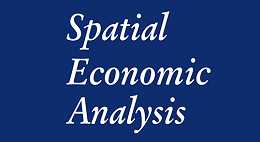Do monetary subjective well-being evaluations vary across space? Comparing continuous and discrete spatial heterogeneity
Using subjective well-being estimations, this study analyzes whether compensating variations vary across space using a cross-sectional data set from Chile. To achieve this goal, it describes and compares two econometric ways of modelling unobserved spatial heterogeneity. Both approaches allow compensating variations to vary across spatial units by assuming some distribution a priori. One method assumes that the spatial heterogeneity can be represented by a discrete distribution (a group of regions that share the same coefficient) and the other that the preferences can be represented by a continuous distribution (each region has a different coefficient). The results show that focusing just on the average estimates of compensating variations, as the applied studies have done so far, masks useful local variation. More empirical studies are needed to assess the advantages and disadvantages of both econometric approaches and how their results compare across a wide range of conditions and samples.


